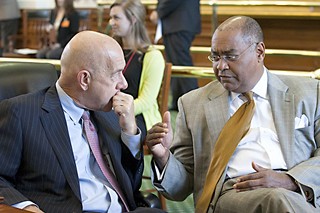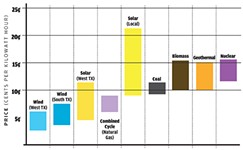There They Go ... Here They Come Again
A no-drama session ends – will a high-drama special follow?
By Richard Whittaker, Fri., May 31, 2013

There's a line in the film Magnolia: "We might be through with the past, but the past ain't through with us." As the 83rd Legislature's regular session limped to an end on Memorial Day, lawmakers knew they would be back for a special session; what they didn't know was how fast. Ultimately, they didn't even have time to return to their hotel rooms, as Gov. Rick Perry called them back less than an hour after both chambers gaveled out, sine die. But as they return this week, legislators won't be dealing with leftover issues from this session. Instead, they will return to tackle the damage done back in 2011 by the 82nd session, and they may be doing that for months to come.
The meat of the first special is one issue: redistricting. Perry wants the Legislature to return and quickly adopt the interim maps drawn by judges in San Antonio to replace the unconstitutional maps the Legislature drew in 2011. The timing could barely have been more aggravating for lawmakers and their staffs. Rather than give them a respectful few days to recover after a brutal weekend of long nights, Perry issued the call for a special just after the House wrapped up its regular business a little after 5pm on May 27. (A semi-joke quickly did the rounds that lots of seats on flights to Las Vegas were coming open as staffers canceled their post-session plans.)
The Senate scarcely broke stride, reconvening at 6pm and going back into recess until Thursday, May 30. Senate Finance Committee Chair Tommy Williams, R-The Woodlands, commented that the time between the regular and special sessions was less like an interim and more like a bathroom break. Meanwhile, the House had already scattered to the winds, heading either home or to sine die parties – only to quickly learn that they would be back, bright and early, on Tuesday, May 28. As Rep. Van Taylor, R-Plano, ruefully tweeted, "Started to go home to my family, then had to turn around."
No Stress Straus
Perry's call also gave lawmakers no chance to reflect on the regular session. In the early days, it had the makings of a chaotic mess. There was an almost unprecedented number of freshman and sophomore lawmakers and, as any Lege-watcher can tell you, nothing derails the legislative process more than amateur hour at the back mic. They spilled in from a combination of the Tea Party revolution of 2010, the 2011 gerrymandering, and a series of brutal GOP primaries in 2012. At the beginning of the session, many seasoned lawmakers feared months of carnage. In fact, nothing much happened. No Tea Party rebellion, no mad dash to the right, no heavy push on hot topic issues like fetal pain bills. Rep. Eddie Rodriguez, D-Austin, said, "It seemed like Republicans didn't want to tackle some of these controversial issues." He credited the management style of Speaker Joe Straus, R-San Antonio, for placating the Tea Party ground troops after their failed attempt to remove him at the beginning of the session. "Every bill got a fair hearing and a fair shake," Rodriguez said.

There was the odd dash of venom in the soup. In the closing days, a handful of state reps took revenge against their Senate counterparts for killing their bills by shoving in measures from the upper chamber. But that was about as brutal as it got on the floor. Instead, the bitterest fight was between lawmakers and lobbyists.
In an attempt to crack down on dark money in elections, Sen. Kel Seliger, R-Amarillo, authored Senate Bill 346, which would require 501(c)4 nonprofits that cross the line between advocacy and politics to file campaign finance reports. Cue the fury of right-wing pressure groups like Empower Texans, whose executive director, Michael Quinn Sullivan, twisted so many arms that the Senate tried to recall the bill. However, the House wouldn't play ball. When the measure looked in danger of veto by Perry, Rep. Charlie Geren, R-River Oaks, tried a Hail Mary, bolting some of its terms into SB 219, the Ethics Commission Sunset bill. In a double blow over the weekend, first Perry vetoed SB 346, then the SB 219 conference committee ripped out Geren's amendment. Seliger's fury was immediate. In a press release, he fumed against Perry's veto, stating that, "as other states have stepped forward to ban election money laundering by dark money 501(c)4 non-profit corporations, it is embarrassing that the Lone Star state is now an official safe haven for political money launderers."
But more generally, the session was free of drama. Even the old legislative sport of Austin-bashing seemed to have faded away. The local delegation worked – mostly behind the scenes – to counter the drumbeat against Travis County D.A. Rosemary Lehmberg; her DWI conviction had allowed the GOP to ramp up perennial calls to move the Public Integrity Unit (the prosecutorial office, with statewide authority, designed to police lawmakers and officeholders) out of her office. That measure failed, and there were few other measures designed to make life difficult in the ATX. Rodriguez put that down to the city's growth as a major city and commercial center. He said, "Picking on Austin isn't as fun for these guys as it was in the 1990s."
Minority Leverage
As always, the one must-pass measure was the budget, and the House and Senate finally agreed on a $197 billion spending plan for the next two years. That's a 3.7% increase from the current biennium, but the surprising component is an 8.3% rise in the state's general revenue spending, up from $87 billion to $95 billion. House Appropriations Committee veteran Rep. Dawnna Dukes, D-Austin, said this was the least painful budget building process since 2003, "when we had to make deep, deep cuts to the bone marrow." But this wasn't just about pouring limited funds out of one bucket and into another. "The frustration that still existed was the uncertainty of knowing what monies were truly available to make restorations," Dukes said, and that was exacerbated by warring definitions of how to calculate the constitutional cap on spending increases. In the final weeks, the fight came down to what Dukes described as a daisy chain of legislation. Three bills became logjammed together: House Bill 7, an omnibus revision of fees and dedicated funds; Senate Joint Resolution 1, which, if approved by voters in a November constitutional amendment, will establish a statewide water infrastructure investment bank; and HB 1025, the supplemental appropriations bill. Dukes said, "The appropriations bill was dependent upon all of those three."
By the middle of the last week, it had come down to a staring match: The Senate wouldn't pass HB 1025 unless the House passed SJR 1, and vice-versa. So who blinked first? From where Austin Rep. Donna Howard sat, in her first session on Appropriations, it looked like both chambers quietly agreed to blink at the same time: "Some of the votes that were done on the House side, and some of the votes on the Senate side, were done in order to give the other side the cover they needed to move forward." While the end result is far from perfect, she said she's "extremely pleased" about the general outcome, and surprised overall at her first session on the House budget-building body. She said, "For one that thought she didn't have a way with numbers, I have been finding more and more that I really enjoy understanding the weeds in regards to the numbers."
It's been a long time since any Democrat declared themselves happy with a budget, and there was still discontent over measures like an extra $667 million in franchise tax exemptions. But the Democrats' overall happiness came down to numbers not in the budget, but rather in the vote totals. Tea Party Republicans would not back the budget or SJR 1, so the GOP leadership knew it would need Democratic votes to pass vital legislation. The small gains made by Democrats in the 2012 elections were enough to change the balance of power, Rodriguez said: "The difference between 49 Democrats and 55 Democrats may not seem like a lot, but it's all the difference in the world when you need 100 votes."
In return, Democrats got an extra $3.9 billion into public schools. That falls short of the $5.4 billion cut inflicted during the last session, but it will reduce some of the damage. Dems also won increased contributions to the Teacher Retirement System of Texas, and ended an accounting trick that used the malfunctioning System Benefit Fund to balance the state books. Originally designed to help poor Texans with their utility bills, it had barely been touched for its intended use, so Democrats and Republicans struck a deal to distribute it out to the state's poorest ratepayers over the next three years, and wind it up in 2016. There is even extra cash for the Women's Health Program. Dukes said, "We saw them as negotiable points that were unbending to us. If you needed our votes, that was what Democrats required."
Getting an Education
In hindsight, the 83rd regular session may well be seen as an education session. Firstly, SB 2 opened the door to a slow increase in the number of charter schools. It was a victory of sorts for Senate Education Committee Chair Dan Patrick, R-Houston, but it was nothing like what he wanted. His bill originally wanted the cap completely removed; instead, he got a phased increase, from the current statewide limit of 215 to a new maximum of 305 by 2019. (Patrick's newfound willingness to negotiate, after a run of Tea Party absolutism, was one key indicator of the decline in the Republican radical fervor that blew up the last session.) Then there was HB 5, a radical overhaul of the school accountability and high school graduation system. It dumps the current "4×4" testing regimen and replaces it with the foundation plan, whereby students have to receive 22 credits to graduate high school. Meanwhile, schools will no longer be gauged as academically acceptable, unacceptable, recommended, or exemplary, but instead graded A to F. Supporters argue the changes will relieve pressure on schools to teach to the test, and will give kids more pathways to graduation. Eddie Rodriguez, who added two amendments increasing the amount of student graduation planning, called it "Landmark legislation. ... Greatly reducing the number of end-of-course exams and creating curriculum paths more relevant to the real world are real reforms parents have been asking for."
Rodriguez's fellow Travis County Democrat, Rep. Mark Strama, was less convinced. He originally voted against the bill, warning that it placed too little emphasis on academic rigor, and he has continually spoken up in favor of high-stakes testing. "Most of the people who are most upset about testing are really upset about the culture of testing in the classroom," he said, adding that "those parents don't realize what testing has done to focus attention on kids who need the most from the school system." In fact, he argues that the reforms will actually worsen the situation: There will be less longitudinal tracking data and, by reducing the number of tests, "All that does is concentrate the stakes on a smaller number of tests."
This was supposed to be Strama's last tour under the Dome, since he had already declared he would not run for re-election. The active phase of his lame-duck term is extended by the special session: It could run for just a few days, depending on how fast the GOP can move on the maps, and whether Perry adds more items to the call. Or he may not be handing his office keys back any time soon, as the redistricting push could yet hit rough waters. Lt. Gov. David Dewhurst has already made it clear he intends to abandon the Senate's two-thirds rule for the special, meaning maps only have to pass by a simple majority, not the two-thirds majority required in a regular session. The San Antonio courts have already expressed their discontent about legislative trickery in the 82nd session, and there is no reason to believe they will be any less forgiving in the 83rd.
The judges, in fact, are not done with the maps themselves: They are awaiting a ruling from the U.S. Supreme Court on Section 5 of the Voting Rights Act before they revisit the matter. Even if the Legislature passes the maps this week and goes home for a long weekend, they could be back again before candidate filings begin at the end of the year. They may think they'll be done with the past, but if the long, bloody history of Texas redistricting is any measure, the past is far from done with them.
And then there's still education funding. Early in the session, Judge John Dietz issued a ruling from the bench that the current school finance system is unconstitutional (see "Dietz Rules Against School Finance System," Feb. 8), but he was holding back on his full written ruling until he knew what the session would deliver. That modest $3.9 billion boost for education is unlikely to soften his language. The last time the Legislature tackled school finance, back in the mid-2000s, it took multiple special sessions over several years to come up with what seemed to be a workable solution. If any part of Dietz's ruling survives the seemingly inevitable legal challenge from Attorney General Greg Abbott, it could be a long time until the past is done with the 83rd Legislature.
Got something to say on the subject? Send a letter to the editor.











